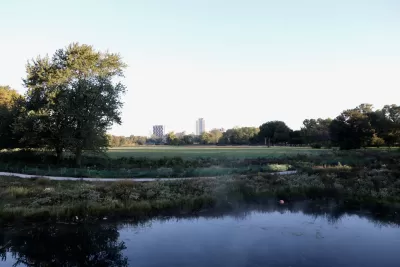The project will bring money and visitors to Chicago’s South Side, but the community wants more assurances that the future of residents will be a priority.

Audrey F. Henderson reports on a series of ongoing issues surrounding the Obama Presidential Center, which will be located in Jackson Park on Chicago’s South Side. The center is expected to generate close to $250 million annually and bring thousands of jobs to the area, but concerns remain about the economic and environmental impacts of the project.
The Obama Foundation has refused to sign a community benefits agreement, but community activists say it is necessary to ensure accountability. Residents are also concerned that plans to close off a major thoroughfare in the park, along with the hundreds of thousands of visitors expected at the center each year, will result in extreme congestion in an area where transportation options are already lacking. In addition, a lawsuit filed by Protect Our Parks challenges the location of the center on parkland and will likely lead to project delays.
Henderson notes that worries about the long-term equity impacts of the project and the city’s geographic inequality are driving the opposition:
In many ways, displacement and gentrification represent the elephants in the room for the Obama Presidential Center. The disparity in income and amenities is significant between much of the south and west sides of the city and the more affluent North Side. Residents of neighborhoods adjacent to the proposed Obama Center fear that they will be priced out of their homes, especially if they are renters, says [Jawanza] Malone.
Still, Henderson says that the center will likely overcome these various challenges, unlike the Lucas Museum of Narrative Art, which lost its bid to build in Chicago in 2016.
FULL STORY: Will Obama’s Presidential Center Invigorate or Gentrify Chicago’s South Side?

Planetizen Federal Action Tracker
A weekly monitor of how Trump’s orders and actions are impacting planners and planning in America.

Maui's Vacation Rental Debate Turns Ugly
Verbal attacks, misinformation campaigns and fistfights plague a high-stakes debate to convert thousands of vacation rentals into long-term housing.

Cuomo Is the Candidate of Both NIMBYs and Developers. What Gives?
In the New York City mayoral race, odd bedfellows align to preserve the housing status quo.

The Subversive Car-Free Guide to Trump's Great American Road Trip
Car-free ways to access Chicagoland’s best tourist attractions.

San Antonio and Austin are Fusing Into one Massive Megaregion
The region spanning the two central Texas cities is growing fast, posing challenges for local infrastructure and water supplies.

Charlottesville Temporarily Has No Zoning Code
A judge ordered the Virginia city to throw out its newly revised zoning code, leaving permitting for new development in legal limbo.
Urban Design for Planners 1: Software Tools
This six-course series explores essential urban design concepts using open source software and equips planners with the tools they need to participate fully in the urban design process.
Planning for Universal Design
Learn the tools for implementing Universal Design in planning regulations.
Heyer Gruel & Associates PA
JM Goldson LLC
Custer County Colorado
City of Camden Redevelopment Agency
City of Astoria
Transportation Research & Education Center (TREC) at Portland State University
Jefferson Parish Government
Camden Redevelopment Agency
City of Claremont





























